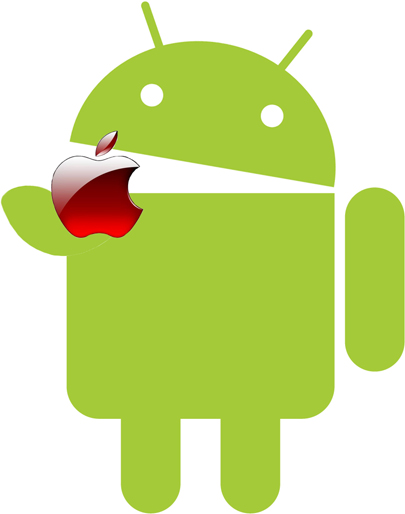Seven reasons why Apple’s greatest rival is now Google – and why Apple had better watch its back
Years ago, it was Microsoft – who had the better home computer OS?
More recently, it was Adobe – was Flash worthy of the iPhone’s greatness?
Now, it’s Google, and the stakes are higher than ever.

Reason one: Android OS.
Google’s relatively new operating system, Android, is a smash hit. The mobile platform is used on a variety of smartphones spanning several different brands. This choice in hardware brand is an option that Apple can’t offer with its iPhone (or RIM with its Blackberry line, for that matter). The operating system is smooth, efficient, and capable, on par with all its competitors but evolving faster. Apple’s OSX must not take the ‘Droid lightly.
Reason two: Google Chrome.
Many Apple users remained with Safari even when Mozilla launched FireFox. But Google Chrome, like Android, became a smash hit for both personal and office computer use, on both PCs and Macs, as Chrome incorporated the sleek simplicity of Safari with generally superior performance and capabilities. Safari hasn’t yet dropped to Internet Explorer-lows, but it’s often the last major browser to catch up on the latest tech trends (such as third-party extensions).
Reason three: Openness versus secrecy.
Steve Jobs is about as tight-lipped as CEOs come. With the volume of secrets he keeps tucked in the sleeves of his trademark black turtle neck, you’d think he ran a nuclear war company in the Middle East. Google, contrastingly, engages its users with open betas, public announcements, and a general philosophy that they don’t have much to hide. This style of business management is winning more and more hearts in a social media-dominated world where consumers demand corporate transparency. If Apple keeps its blinds shut and doors locked, Google’s forthcoming rival services may out-brand Apple’s established counterparts.
 Reason four: Acquisition pace.
Reason four: Acquisition pace.
Apple likes to grow and evolve organically, which has worked well for them, but it can make forays into new services difficult (and Apple certainly doesn’t celebrate failures like Google does). But the purchase-happy Google averages one full acquisition per month, generating a constant in-stream of new talent, fresh perspectives, and innovative outside technologies. This can lead to huge and rapid leaps, where Google can go from knowing and doing nothing in a certain field to suddenly becoming a legitimate contender – which leads to the next few points.
Reason five: Forthcoming music store.
Google plans to launch a service similar to iTunes around Christmas time that is apt to give Apple a run for its money.
Reason six: Forthcoming TV service.
Google also plans to launch a service similar to Apple TV by the end of this year (U.S.) and throughout next year (globally) that is, again, apt to give Apple a run for its money.
Reason seven: The “everyday essential” factor.
Most people can live without Apple. Few can live without Google.
This is the “everyday essential” factor. Many people search the internet on a daily basis, but most don’t just “search,” they “google.” And aside from some antiquated Mapquest users, most people without portable GPS systems plug in address in Google Maps regularly. Want some images? You probably use the newly revamped Google Images. Like to stay on top of certain news topics? You probably use Google Alerts.
Google has constructed an empire not with massive product lines or revolutionary services, but with everyday, household and office staples. Apple offers some sleek hardware that neatly packages smooth-running software, but people don’t rely on its existence like they do Google.
So when Google launches Google Music and Google TV – and who knows what else – Apple better not underestimate the threat. Because Adobe’s Flash controversy will be the least of Apple’s worries in 2010 when Google is through with them.
Google’s only downfall is perhaps its core revenue stream. Advertising brings in more than 95 percent of the company’s revenue. And while it’s currently extremely lucrative, having only one effective way to profit may be crippling in the long term for Google, with Apple generating cash flow from a diverse range of hardware and software.




